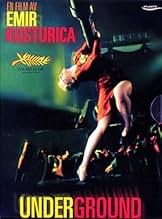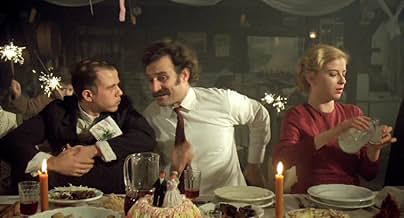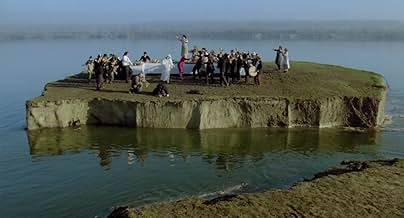Two underground black marketeers, Marko and Blacky, sell weapons to the Communist resistance in wartime Belgrade, living the good life along the way.Two underground black marketeers, Marko and Blacky, sell weapons to the Communist resistance in wartime Belgrade, living the good life along the way.Two underground black marketeers, Marko and Blacky, sell weapons to the Communist resistance in wartime Belgrade, living the good life along the way.
- Awards
- 8 wins & 11 nominations
Predrag 'Miki' Manojlovic
- Marko
- (as Miki Manojlovic)
- …
Srdjan 'Zika' Todorovic
- Jovan
- (as Srdjan Todorovic)
Danilo 'Bata' Stojkovic
- Deda
- (as Bata Stojkovic)
Nele Karajlic
- Falling Gypsy
- (as Dr. Nele Karajlic)
Storyline
Did you know
- TriviaThe director's cut ran for over 320 minutes.
- Alternate versionsThere is a 300 minutes version of this film produced for television.
- ConnectionsFeatured in Cannes... les 400 coups (1997)
Featured review
Comical, chaotic, patriotic, satirical, philosophical, questioning, critical, ironic and many other things, throughout the plot we perceive the different layers of the plot, which in turn, requires a certain abstraction from those who watch, because in general, the characters and lived situations are just abstractions or representations.
Divided into three acts, it tells the story from the beginning to the end of Yugoslavia, through WWII, the Cold War and the dissolution of the country. We have four characters, and here, I'm going to talk a little bit about what each one represents, according to what I understand.
Crni: The Partizans, who truly love the country, fight and die for it.
Natalija: Yugoslavia itself, which at a certain moment is with Germany represented by the Official, at a certain moment with the Rebels, and a good part with the Politicians.
Marko: The corrupt, politicians, generals who, in order to stay in power, commit the greatest atrocities and betray the trust of even their brothers, friends and family.
Ivan: The Yugoslav people, who, don't understand what's happening when the war starts, much less when the war ends and Yugoslavia ends. Perhaps symbolized as on crutches, due to the country's institutional fragility.
In the first act, we have the second world war, where Natalija has love for the first three characters (Crni and German Officer, Marko), representing, the passage of domination throughout history, Crni at one point tries to date Natalija, but who does date her? Is the officer, and after the war with the Allied victory ends up staying with Marko. Also, we have a memorable scene of Ivan hitting the officer and saying, "You think you're going to have her, you filthy pig."
In the second act, we have the cold war and also the longest act of the film, I believe due to the long 40 years of the period. Right now we have The characters trapped living in a basement forced to build weapons, living under sub-human conditions, which to me means, the curtain of communism in relation to capitalism. The guns, it represents, perhaps the arms race. Marko, the politician/general who profits and lives very well from this arms trade (portrayed in Lord of War) while leaving the people living in fear of enemy domination, closed to the world that exists beyond the basement.
In the last act, we have Ivan, totally weakened from having lived through so many wars, who discovers he is being deceived all the time about the basement and the lies told as a form of control, coming across the capitalist world for the first time, having a shock to discover that your country no longer exists. In fact, the doctor who talks to him, perhaps represents NATO.
The most interesting thing for me is that the film does not seek to point out right and wrong, villains and heroes, only to portray the facts in a raw and comic way.
Anyway, I hope that my interpretation of what this film tries to tell will help other cinephiles. I'm Brazilian so I may have misunderstood the film if that's the case forgive me, I did a quick read about Yugoslav history to write this review.
Divided into three acts, it tells the story from the beginning to the end of Yugoslavia, through WWII, the Cold War and the dissolution of the country. We have four characters, and here, I'm going to talk a little bit about what each one represents, according to what I understand.
Crni: The Partizans, who truly love the country, fight and die for it.
Natalija: Yugoslavia itself, which at a certain moment is with Germany represented by the Official, at a certain moment with the Rebels, and a good part with the Politicians.
Marko: The corrupt, politicians, generals who, in order to stay in power, commit the greatest atrocities and betray the trust of even their brothers, friends and family.
Ivan: The Yugoslav people, who, don't understand what's happening when the war starts, much less when the war ends and Yugoslavia ends. Perhaps symbolized as on crutches, due to the country's institutional fragility.
In the first act, we have the second world war, where Natalija has love for the first three characters (Crni and German Officer, Marko), representing, the passage of domination throughout history, Crni at one point tries to date Natalija, but who does date her? Is the officer, and after the war with the Allied victory ends up staying with Marko. Also, we have a memorable scene of Ivan hitting the officer and saying, "You think you're going to have her, you filthy pig."
In the second act, we have the cold war and also the longest act of the film, I believe due to the long 40 years of the period. Right now we have The characters trapped living in a basement forced to build weapons, living under sub-human conditions, which to me means, the curtain of communism in relation to capitalism. The guns, it represents, perhaps the arms race. Marko, the politician/general who profits and lives very well from this arms trade (portrayed in Lord of War) while leaving the people living in fear of enemy domination, closed to the world that exists beyond the basement.
In the last act, we have Ivan, totally weakened from having lived through so many wars, who discovers he is being deceived all the time about the basement and the lies told as a form of control, coming across the capitalist world for the first time, having a shock to discover that your country no longer exists. In fact, the doctor who talks to him, perhaps represents NATO.
The most interesting thing for me is that the film does not seek to point out right and wrong, villains and heroes, only to portray the facts in a raw and comic way.
Anyway, I hope that my interpretation of what this film tries to tell will help other cinephiles. I'm Brazilian so I may have misunderstood the film if that's the case forgive me, I did a quick read about Yugoslav history to write this review.
- igornveiga
- Jul 28, 2022
- Permalink
- How long is Underground?Powered by Alexa
Details
- Release date
- Countries of origin
- Languages
- Also known as
- Once Upon a Time There Was a Country
- Filming locations
- Plovdiv, Bulgaria(Tunels)
- Production companies
- See more company credits at IMDbPro
Box office
- Budget
- $14,000,000 (estimated)
- Gross US & Canada
- $171,082
- Gross worldwide
- $182,134
- Runtime2 hours 47 minutes
- Color
- Sound mix
- Aspect ratio
- 1.85 : 1
Contribute to this page
Suggest an edit or add missing content































